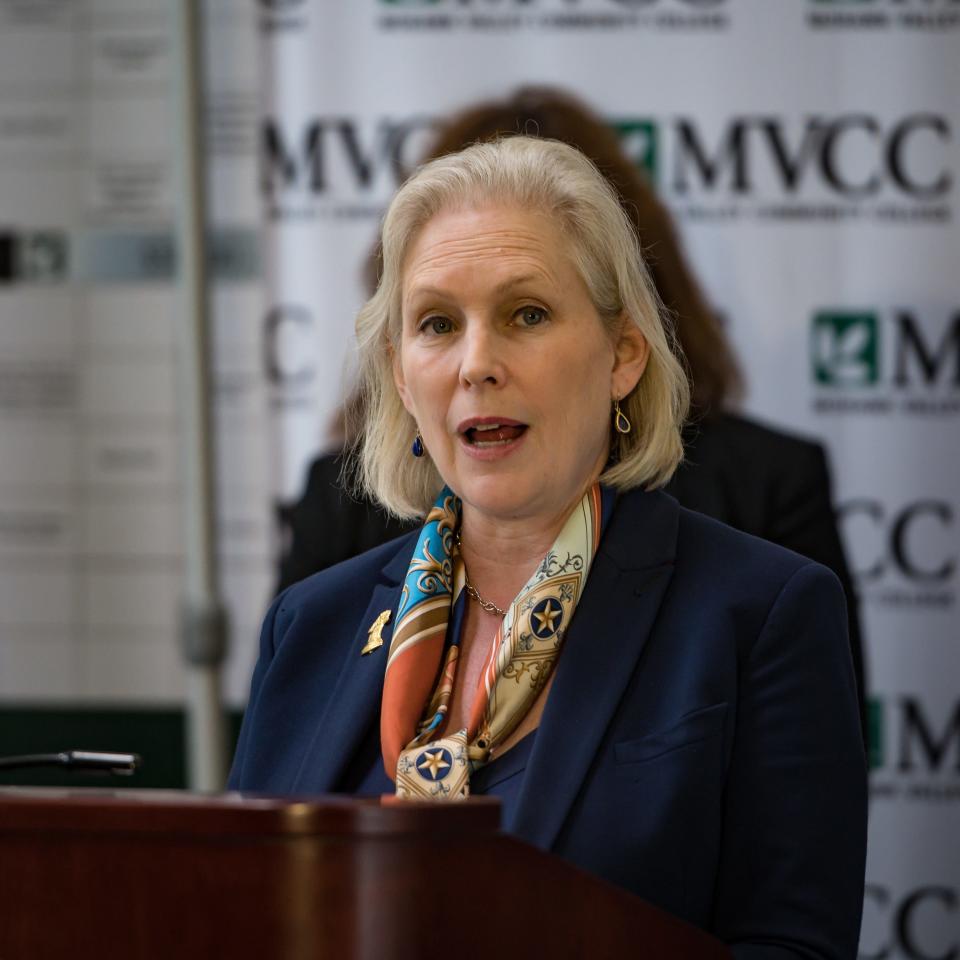Chemical pollution victims in NY could more easily sue manufacturers under new bill
Victims who've experienced significant contamination from so-called "forever chemicals" could more easily sue manufacturers of the harmful substances, thanks to newly proposed legislation in New York.
Senator Kirsten Gillibrand announced the PFAS Accountability Act Thursday, taking aim at water contamination caused by PFAS, or per- and poly-fluoroalkyl substances, which are found in everyday objects like nonstick pans and food packaging, and, when ingested, can cause health problems like cancer, low birthweights and thyroid function.
The legislation would also make it easier for victims to be awarded medical monitoring for early detection and treatment of diseases associated with PFAS exposure.
"PFAS are dangerous, carcinogenic substances and the companies that knowingly manufactured them for years must be held accountable," Gillibrand said in a press release Thursday. "And because PFAS-related illnesses can take years to develop, this bill also makes sure that victims can receive long-term medical monitoring as part of their remedies."

What are PFAS?
PFAS are used to make coatings and products that resist heat, oil, stains, grease and water, according to the Centers for Disease Control and Prevention, and can be found in clothing, furniture and heat-resistant non-stick cooking surfaces.
The "forever chemicals" are linked to a series of health problems, Gillibrand says, including developmental delays and changes in your liver. PFAS may also increase your risk of some cancers.

In June 2022, the Environmental Protection Agency (EPA) announced allowable levels for PFAS in drinking water were too high.
New health advisories for PFOA and PFOS — two of the most widely used of thousands of PFAS — were issued by the EPA, placing their acceptable drinking water levels near zero, a level so low it currently can’t be measured.
In 2016, the EPA had set the health risk level at 70-parts per trillion. New York went even further four years later, establishing a ten-parts per trillion standard for the chemicals in drinking water.
Gov. Kathy Hochul also banned the use of PFAS chemicals in the manufacturing of apparel and clothing, which went into effect at the end of last year.
PFAS: NY cities fighting for safer drinking water praise new warning on toxic 'forever' chemicals
How the legislation would help PFAS exposure victims
Multiple agencies have supported the bill, including Environmental Advocates NY and the New York League of Conservation Voters.
"Too many communities in New York have been poisoned by toxic PFAS chemicals that big corporations have dumped into our environment," says Environmental Advocates NY Director of Clean Water Rob Hayes. "The chemical industry knew the health risks of these forever chemicals when they put them in products. These polluters should bear the costs of life-saving medical monitoring for people they've put in harm's way."
Here's how Gillibrand's legislation is proposing to help those significantly exposed to PFAS:
Enable those affected by PFAS to sue manufacturers. "Significantly exposed individuals" are those who were present in an area where PFAS was released for at least a year, or those whose blood testing reveals PFAS exposure.
Make it easier for PFAS exposure victims to receive medical monitoring. Medical monitoring for victims of hazardous exposures would be used for early detection and treatment of adverse health conditions related to the exposure.
Incentivize the industry to fund PFAS safety research. New or additional epidemiological, toxicological or other studies or investigations of new PFAS could be ordered by the court.
New York State Team reporter Thomas C. Zambito contributed to this report.
Emily Barnes is the New York State Team consumer advocate reporter for the USA TODAY Network. Contact Barnes at ebarnes@gannett.com or on Twitter @byemilybarnes.
This article originally appeared on Rochester Democrat and Chronicle: Chemical pollution victims in NY could get justice thanks to new bill

